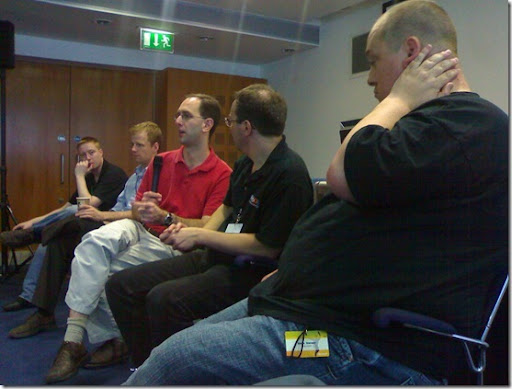I had a great time in London over the last couple of days at MIX 07 UK. Most of the excitement was about Silverlight, but there was also a lot of coverage of VS2008. I've been reading a lot about Silverlight recently, but this was the first time I'd seen a good demonstration of it in use. It's obviously Microsoft's Flash killer and it fills a big gap in RIA application development where you'd currently have to use Flash. For .net developers like me it opens up some great opportunities, so it can only be good. I guess its success will primarily hinge on how well Microsoft drives adoption. Scott Guthrie explained that they only have to persuade about 15 of the top sites to use it and it will become ubiquitous. One thing that really struck me, that I hadn't properly grepped before was how core XAML is to the current MS development stack. I really liked the way you could use the Expression * tools to move XAML projects between designers and developers. Those tools (especially Blend) are yet another thing I need to play with.
I went to the second of the VS2008 sessions, but it was pretty much covering stuff I already knew, although it was nice to see all the LINQ to SQL stuff presented. One thing that was new was the Rails style scaffolding stuff. I don't remember what it was called, but MS have blatantly got their eyes on the Ruby camp. Only for the best I think.
I was also really looking forward to the 'Why IronRuby', and 'IronPython et al' sessions. Dynamic languages are generating some real excitement these days and was very keen to get some insight into how Microsoft sees them playing with .net. 'Why IronRuby' by Dave Verwer was a bit of a disappointment, not because Dave didn't do an excellent job introducing Ruby, but I was rather hoping for a more philosophical discussion about dynamic languages in the .net world and how well they play with the existing MS technology stack. I had to leave before the questions, so maybe there was some interesting discussions? I hoped to grab Dave for a chat later on, but I couldn't track him down. Michael Foord's (aka Fuzzyman) IronPython session was much more what I wanted. Michael spent a lot of time digging into the intricacies of building dynamic languages on top of the CLR, the DLR and some of the cool stuff you could do with IronPython and Silverlight. I'm kinda seeing what the Python and Ruby people are saying about the benefits of dynamism, but I'm still not quite ready to really embrace it yet. The opportunity will come when the IronRuby implementation has been fully developed in a year or so, but I must stay, the DSL story from the Ruby camp is very compelling.
My favorite session was the 'A nice cup of tea and a sit down', a panel discussion with Scott Guthrie. As you probably know, Scott is the general manager of the .net development group and his blog is always my first stop to keep up with what's happening at MS. It's not everyday that you get to fire some questions at one of the core .net guys, so I really enjoyed myself.
I asked Scott about TDD at Microsoft and how they saw TDD fitting in with their products. I was especially keen to hear what he thought about the problems with mocking the BCL.
He told us about a new MVC framework that's in the pipeline for ASP.NET that sounded very intriguing and how they were consciously trying to keep it interoperable with open source tools. I was especially gratified to hear him mention Windsor and RhinoMocks.
It's a shame there wasn't more time, I really wanted to ask him about functional programming and LINQ and how explicitly MS are going to encourage more declarative programming styles in the BCL and documentation. Right now the message seems to be that LINQ is query and the functional declarative stuff is only mentioned if you're prepared to dig deep.

No comments:
Post a Comment
Note: only a member of this blog may post a comment.